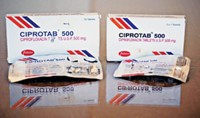Advertisement
Grab your lab coat. Let's get started
Welcome!
Welcome!
Create an account below to get 6 C&EN articles per month, receive newsletters and more - all free.
It seems this is your first time logging in online. Please enter the following information to continue.
As an ACS member you automatically get access to this site. All we need is few more details to create your reading experience.
Not you? Sign in with a different account.
Not you? Sign in with a different account.
ERROR 1
ERROR 1
ERROR 2
ERROR 2
ERROR 2
ERROR 2
ERROR 2
Password and Confirm password must match.
If you have an ACS member number, please enter it here so we can link this account to your membership. (optional)
ERROR 2
ACS values your privacy. By submitting your information, you are gaining access to C&EN and subscribing to our weekly newsletter. We use the information you provide to make your reading experience better, and we will never sell your data to third party members.
Safety
Counterfeit Trade Is Growing Worldwide
OECD study says at least $200 billion worth of fake goods, including drugs, are sold annually
by Glenn Hess
June 7, 2007
Trade in counterfeit and pirated goods across national borders totaled at least $200 billion in 2005, according to a report released on June 4 by the Paris-based Organization for Economic Cooperation & Development (OECD).
But the actual value of counterfeit items made and sold worldwide, ranging from pharmaceuticals to computer software, likely was several hundred billion dollars higher, OECD adds.
"Trade in counterfeit goods is a big problem and getting bigger," says John Dryden, deputy director of OECD's Directorate for Science, Technology & Industry. "It is pervasive, it involves some pretty unsavory and ruthless characters, and it has serious implications for health, safety, living standards, and jobs. It is also a major disincentive to invent and innovate."
The study says fake goods are being produced and consumed in most economies, with Asia emerging as the main region for such trade and China as the single largest source of production. "The items that counterfeiters and pirates produce and distribute are often substandard and can even be dangerous," OECD says.
The report identifies different consumption patterns across the world. It notes that counterfeit drugs are a major problem in Africa and that there have been big seizures in Europe and North America.
"Now more than ever, policymakers need to take a serious look at the potential ramifications the illicit counterfeit business can have on the health of patients around the world," says Billy Tauzin, president of the Pharmaceutical Research & Manufacturers of America (PhRMA), an industry group representing brand drugmakers.
"The OECD report reinforces PhRMA's concerns about this dangerous trend and the possibility of counterfeit medicines creeping into the U.S. drug supply system, particularly if Congress opens the floodgates to imported medicines from abroad," Tauzin adds.
According to the report, a major challenge facing governments and business is getting reliable and up-to-date information on the extent of counterfeiting and piracy and the impact on economies. OECD recommends that governments and business invest more in collecting and analyzing information, agree on a common approach to collecting enforcement data, and develop a framework for reporting the health and safety effects of fake products.



Join the conversation
Contact the reporter
Submit a Letter to the Editor for publication
Engage with us on Twitter